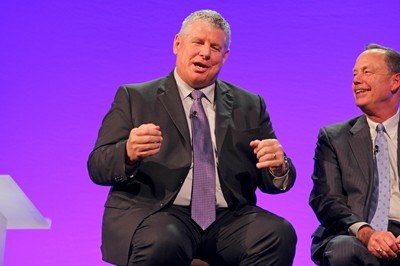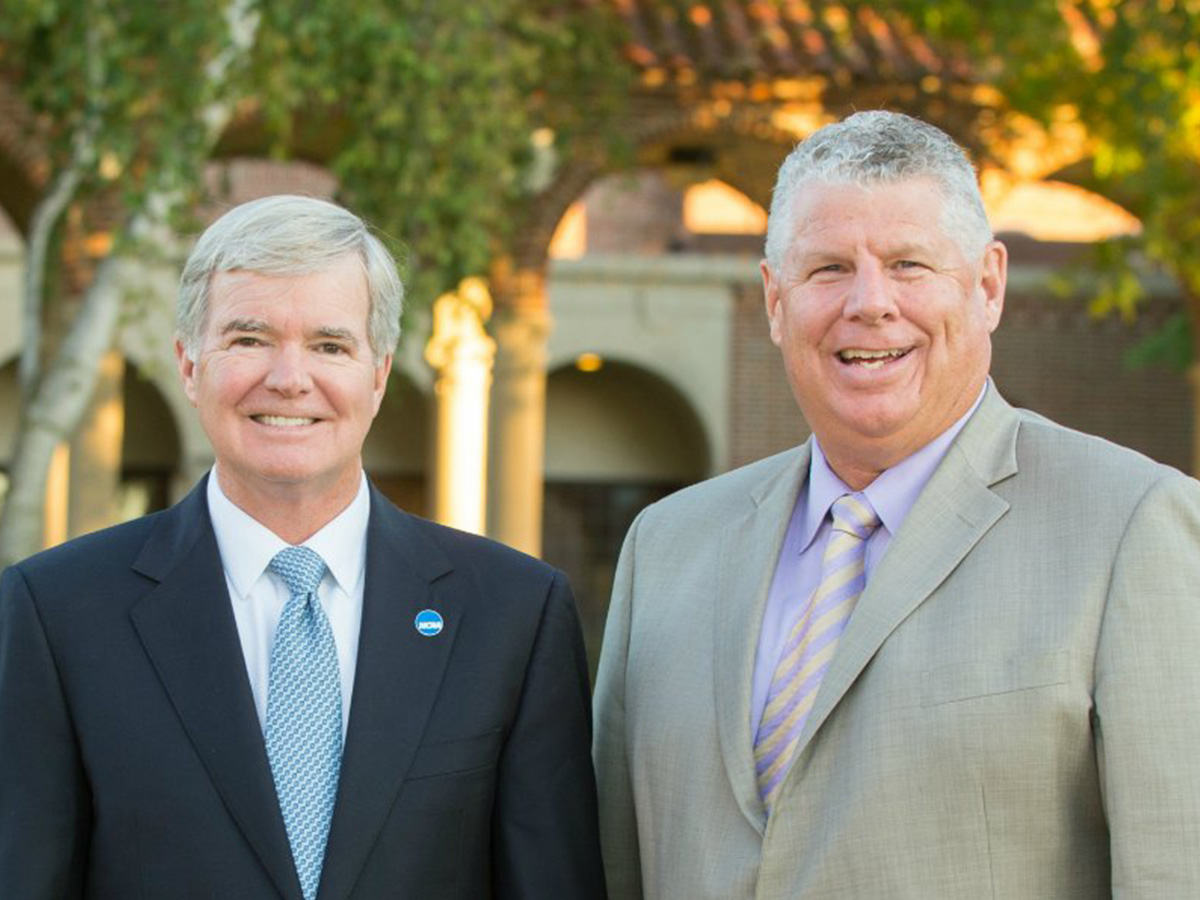In the ever-changing landscape of intercollegiate athletics, higher education and the National Collegiate Athletic Association (NCAA), there are few opportunities to positively influence, shape and lead a membership of many institutions with varying philosophies and values.
This is especially difficult in Division III. Though the NCAA’s largest division has proven in difficult times to adhere to its values and philosophy, having a meaningful and influential voice in the governance structure and process for creating change can feel difficult when the membership consists of 450-plus institutions and 43 conferences.
Division III has shown in recent years that strong involvement and leadership at the national level from institutional presidents and chancellors is a recipe for success, though. Fortunately, for the Upper Midwest Athletic Conference (UMAC), member institutions can rest easy that their voices are being heard and are helping influence change during a critical time in the history of the Association.
For the last five years, University of Northwestern President Dr. Alan S. Cureton has served as a member of the Division III Presidents Council spending the last two as the chair of the Division’s most influential and highest-ranking committee. Additionally, as chair and in his previous role as vice-chair, Dr. Cureton has spent three years on the NCAA Board of Governors (BOG)— the top decision-making body in the entire Association structure.
Through these roles, Dr. Cureton has been on the forefront of making critical decisions and forming policies that impact Division III and the entire NCAA membership. Having the ability to affect change at the highest level has been the most enjoyable part of his responsibilities on both governing bodies.
“What I enjoy is being able to influence and shape policy and introduce new legislation—to be part of the discussion on what the composition of the Board of Governors could be, should be, may be,” Dr. Cureton said. “I’m delighted that I have a voice at the table, that Northwestern has a voice at the table and that the UMAC has a voice at the table, which is all part of pushing forth our mission and our purpose.”
While serving on the Board of Governors, Dr. Cureton was integral in the latest push to ensure fair representation for all three NCAA divisions in the Association. With recent governance and administrative restructuring at the Division I level, there was growing concern that the current composition of the Board of Governors no longer accurately and fairly represented all three divisions.
As part of a sub-committee charged with examining the composition of the Board, Dr. Cureton worked to develop a proposal that would change the number of representatives per division and ensure Division II and III had an equal voice. However, the proposal was met with resistance and, at this time, a change may not happen.
This fall, Dr. Cureton utilized connections he developed through his service on the Presidents Council to build support for a Division III proposal that would legislate a change in the composition. The UMAC co-sponsored a proposal calling for restructuring of the Board, but it was later removed due to association bylaws that only allows the BOG to recommend a change in its membership.
The momentum from the proposal and support from Division III forced the BOG to reconsider a potential change to the composition of the Board. The process is still on-going with a resolution expected at the Spring 2017 BOG meeting.
Dr. Cureton’s persistence and commitment to Division III has ensured that all members and divisions of the Association will continue to have influence during a time when so much public attention and internal efforts from the Association focus on Division I.
With Dr. Cureton’s involvement in this upcoming change and his leadership over the last few years, the UMAC has seen greater exposure at the national level and continues to expand its scope of influence within Division III.
“What I’ve been really pleased with (in being chair) is the opportunity to serve the UMAC and to let people know about the conference,” said Cureton. “Since we’re such a young conference within the NCAA, (it is an opportunity) to gain exposure and to be recognizable as a viable conference, as a legitimate conference and as one that is growing in stature, exposure and strength.”
UMAC Commissioner Corey Borchardt also feels Dr. Cureton’s role in the NCAA has helped elevate the conference on a national level and emphasizes the significance and impact of his leadership. “Dr. Cureton serving in such a critical and prominent role within the landscape of the NCAA and Division III is very significant for our conference,” said Borchardt.
“There are Division III conferences that have never had a president occupy the Chair position of the NCAA Division III Council of Presidents. Thus, the UMAC is privileged to have Dr. Cureton representing our conference in this capacity. Given our league is not even a decade old in NCAA Division III membership, his leadership appointments speak volumes to the credibility and respect that Dr. Cureton carries not just regionally but nationally.”
Additionally, Dr. Cureton recognizes that his service on the Presidents’ Council has not only been positive for the growing UMAC, but also for Northwestern as it continues to develop and strengthen as an institution both academically and athletically.
“It’s been good for me to be in this position,” said Dr. Cureton, “to have that recognition of Northwestern and its role and involvement in the formation of policies, the creation of dialogue and debate of where Division III goes”… it has given Northwestern a great role and visibility and affirmation.”
The UMAC and Northwestern were on full display at the annual NCAA Convention in Nashville, Tennessee, in January, as Dr. Cureton played perhaps the biggest role at the multi-day gathering of administrators, faculty, staff and presidents and chancellors for all three NCAA divisions.
As the chair of the Division III Presidents Council, Dr. Cureton was a key part of the most important sessions throughout the Convention. He kicked off the Convention on stage with NCAA President Dr. Mark Emmert at the Opening Business Session. Dr. Cureton and the chairs of both the Division I and II councils—as well as leaders from all three divisional national Student-Athlete Advisory Committees (SAAC)—participated in a question and answer session regarding the state of each division. Dr. Cureton addressed the future of Division III and a need continually commit to diversity, inclusion and improving the student-athlete experience to ensure the philosophy of the division continues to drive decisions and policy.
Throughout the Convention, Dr. Cureton engaged in numerous leadership and governance meetings leading up to the two key Division III sessions. First, Dr. Cureton provided an update from the Presidents Council at the Division III Issues Forum. He addressed the Council’s work in a variety of areas including health and safety and budgeting for the division. Most importantly, Dr. Cureton addressed the work toward change in the Board of Governors during an open forum.
Dr. Cureton also led the Division III Business Session—the most critical piece of the Convention. During the session, he was responsible for introducing legislative proposals from the membership that were discussed and voted on by the membership.
Only one proposal failed to pass the membership vote, due in large part to the strong voice and influence of the Presidents Council. The group strongly opposed a proposal that would change transfer student eligibility and allow graduate students with remaining athletics eligibility to compete at an institution different from their undergraduate institution. The presidential voice felt the proposal did not fit with the Division III philosophy that emphasizes a four-year undergraduate experience.
Several institutional presidents and the Presidents Council spoke out against the proposal at the Issues Forum and on the floor of the Division III Business Session, which seemed to have a considerable impact on the final vote as it was defeated 291-179. The outcome shows the strength and importance of the presidential voice in the NCAA governance process.

“I believe it is absolutely critical for presidents to be involved with the NCAA because the membership of the Association drives the agenda,” said Dr. Cureton. “We need to have presidents involved in the creation, formation and evaluation of all the policies that deal with the student-athlete experience to make sure it stays on course with the educational commitment and philosophy of the Association, especially in Division III as we accentuate the academic as well as the athletic simultaneously.”
Following the conclusion of voting, the Division III membership recognized Dr. Cureton for serving in the capacity of Chair of the Presidents Council and the invaluable work and change he helped perpetuate for the division. Though the UMAC has benefitted from Dr. Cureton’s leadership during his time in his NCAA role, his impact on intercollegiate athletics—at all levels—will continue for years to come.
“(Dr. Cureton) has been an incredible representative of the UMAC and the success of his leadership during his tenure as the Chair of the Division III Presidents Council has made a positive impact on the identity and advancement of our conference,” said Borchardt. “The UMAC has benefited tremendously from Dr. Cureton not just leading the Division III Council of Presidents, but also from his inclusion and involvement with the NCAA Board of Governors.”
“To ensure that our conference has a voice and a vote at the highest level of governance in the NCAA structure is very fortunate. Beyond the outstanding visibility Dr. Cureton has afforded the UMAC through his NCAA leadership work, our conference has also been privy to the key developments within the Association and garnered greater insight to the dialogue and decisions that continue to shape intercollegiate athletics.”
The original article can be found at umacathletics.com
Also check out our UNW Athletics: Watch games, see schedules, and read about our players and coaches.

